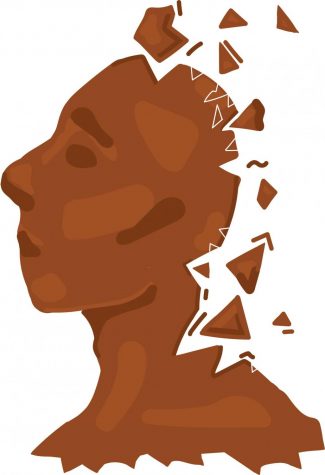Men’s Mental Health: The Macho Mentality
Mental Health Expert Wants Changes
October 27, 2021
With the rise of social media and ease of connectivity and interaction, the importance of addressing mental health issues has grown drastically. Conversations have begun to address the often taboo topic of men’s mental health and how men battle depression and suicide.
According to the National Institute of Mental Health, men are about four times more likely to die by suicide than women through all age groups. According to University of Missouri – Kansas City psychology professor Erin Hambrick, Ph.D., one reason why is the stigma that men need to be tough.

“I think men and women receive different modeling in both how to cope with it and also whether or not it’s OK to seek treatment and the types of treatment that are acceptable,” University of Missouri – Kansas City psychology professor Erin Hambrick, Ph.D., said.
Hambrick believed a lot of how men responded to their mental health issues stemmed from their early youth.
“In boys, acting out is commonly how they show their depression,” Hambrick said. “Anger, outburst and irritability, that’s a really common manifestation of depression. But I think early on, we treat it as, ‘They just need to learn to listen; they just need to learn to do what they’re told; they just need to learn to suck it up,’ instead of teaching emotional processing.”
Because of this early learning, men commonly internalize their issues instead of finding help or support.
“Sadly, men are still socialized to just deal with their problems instead of seeking support,” Hambrick said. “If we just kind of looked at what happens with parents and with teachers, when boys reach out for a need, the world tells boys, ‘You can do it, just do it.’ The world tells girls, ‘Reach out for help; reach out for support.’ The world tells girls crying is a good way to process what happened to you, but it tells boys it’s a sign of weakness.”
For athletes, the ability to open up can be even tougher. The idea of mental health can be seen as being weak, whereas athletes need to be tough.
“I feel like in 2021, there’s not too many things you can talk about without people criticizing your stuff,” junior football player Jermaine Hicks said. “So, especially as an athlete, people will call you mentally weak and stuff. Sometimes, talking about mental health as an athlete can have a downside.”
A big way this stigma was starting to disappear was because of professional athletes taking a stand and addressing their issues. NBA veteran Kevin Love is a known advocate for athletes’ mental health and publicly talks about it.
“I think it’s incredibly important because a lot of people in America and on the planet overall look up to those professional athletes,” Hicks said. “People see that, they feel like themselves as people can do it.”

Hambrick said one struggle for men is the idea they cannot talk about their issues.
“It’s so hard to talk about these things that make us feel vulnerable, and then men haven’t gotten the modeling that that’s a way to show strength,” Hambrick said. “They’ve been shown that’s a way to show weakness.”
According to Hambrick, the best way to change this discomfort is to continue to talk about the issues present.
“I think that the best thing we can do on a daily basis is be role models of talking about the things that we want to destigmatize, of checking in on things that we wish people would check in on us about,” Hambrick said.
Creating good relationships are a component in creating the conversation about mental health.
“When you have a good enough relationship with someone, I think that can open up moments to at least toss something out like, ‘Hey man, if that happened to me, I would feel this way. Let me know if you ever want to talk,’” Hambrick said.
Hambrick stressed the importance of making the small difference in someone’s life, and even if a person does not open it, a seed could be planted for someone else.
“You’re not always going to get people to bite back because you are at the peer level,” Hambrick said. “Trying to do something for them that they’re not seeing in any other spaces in their lives, so it might feel uncomfortable; it might feel sudden. But if you’re the first, whoever comes along and does it second may get somewhere that they wouldn’t have had you not have done something like that.”
As men’s mental health became destigmatized, the door because opened up for conversations and the lowering of statistics.

























